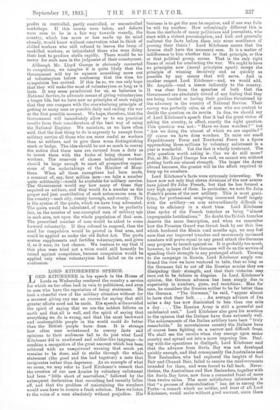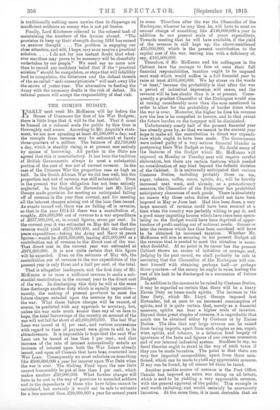_ LORD . KITCHENER'S SPEECH. • - r ORD KITCHENER . in
his speech in the House of Lords on Wednesday rendered the country a service for which we too often look in vain to politicians, and even to men who have the reputation of being statesmen.. He took a cheerful view of the military situation without. for a. moment giving any one an excuse for saying that still greater efforts need not be made.. His speech alikeavoided the spirit of saying that we are the noblest fellows on earth and that all is well, and the spirit of saying that everything we do is wrong, and, that the most backward and contemptible people in the world could do better than the British people have , done. It is strange bow often men accustomed to convey facts and opinions to their audiences fail to do just what Lord Kitchener did in unadorned and soldier-like language--to combine a recognition of the great amount which has been achieved with au unequivocal warning that much yet remains to be done, and to strike through the whole statement (the good and the bad together) a note that invigorates rather than depresses.. As an. example of what we mean, we may refer to Lord Kitchener's remark that the creation of our new Armies by voluntary enlistment had been. " little short of marvellous," followed by the subsequent declaration that recruiting..had recently fallen off, and that the problem of maintaining the numbers would soon have to receive a fresh solution.. Here we listen to the voice of a man absolutely without prejudice. His business is to get the men he requires, and if one way fails be will try another. How refreshingly different this is from the methods of many politicians and journalists, who start with a violent preconception, and kick and generally maltreat the facts before them into some semblance of proving their thesis Lord Kitchener means that the Armies shall have the necessary men. It is a matter of indifference to him whether this or that principle, or this or that political group, scores. That is the only right frame of mind for conducting the war. We ought to have no principles now (moral principles apart) except the principle of winning decisively and as quickly as possible by any means that will serve. And in another respect Lord Kitchener—and, we would add. Mr. Asquith—read a lesson indirectly to the country. It was clear from the speeches of both that the Government are absolutely devoid of any feeling that they are being hustled or having their position threatened by the advocacy in the country of National Service. Their survey was perfectly calm, as of men who are content to decide the question on its merits. In fine, we should say of Lord Kitchener's speech that it had the great virtue of asking the country, in effect, exactly the right question. This question was not : " Have we done wonders ? " but "Are we doing the utmost of which we are capable ? " Of course we have done wonders. To raise our small Expeditionary Force and Territorial Force to a figure approaching three millions by voluntary enlistment in a year is wonderful. Yet the fact is wholly irrelevant. The only question worth asking is : Can we do still more ? For, as Mr. Lloyd George has said, we cannot win without putting forth our utmost strength. The larger the Army abroad becomes, the greater will be the effort required to keep up its numbers.
Lord Kitchener's facts were extremely interesting. We know now not only that eleven divisions of the new armies have joined Sir John French, but that he has formed a very high opinion of them. In particular, we note Sir John French's praise of the new artillery. This is most grati- fying, for professional misgiving concerned itself largely with the artillery—an arm extraordinarily difficult to bring to efficiency in a short time. Lord Kitchener then spoke of the French trenches as being " almost impregnable fortifications." No doubt the British trenches deserve the same description, and when we remember how the Prussian Guard was thrust back by our thin line which bordered the Menin road months ago, we may feel sure that our improved trenches and enormously increased numbers will prove equal to any grand attack the Germans may propose to launch against us. It is probably too much, however, to hope that the Germans will do us the service of spending their strength in any prolonged attack. Turning to the campaign in Russia, Lord Kitchener amply con- firmed the view we have ventured to take, that so long as the Germans fail to cut off the Russian armies they are dissipating. their strength, and that their victories may turn out to be defeats in disguise. In Lord Kitchener's opinion, the German advance has been simply due to superiority in numbers, guns, and munitions. Man for man, he considers the Russian soldier to be far better than the German. " The Germans," he said, " appear almost to have shot their bolt. . . . An average advance of five miles a day has now diminished to less than one mile a day. . . .. The Russian Army is still a powerful and undefeated unit." Lord Kitchener also gave his sanction to the opinion that the Italians have done extremely well. The achievements of the Italian artillery have been " truly remarkable." In mountainous country the Italians have of course been fighting on a narrow and difficult front. We shall see the results when they emerge upon easier country and spread out into a more imposing line. Deal- ing with the operations in Gallipoli, Lord Kitchener said that the advance from Suvla Bay was not developed quickly enough, and that consequently the Australians and New Zealanders, who had captured the heights of Sari Bair and Chunuk Bair, failed to receive the reinforcements intended. for them, and were forced to fall back. Never- theless, the Australians and Now Zealanders, together with the Suvla Bay force, now form a connected front of more than twelve miles. The most satisfactory information is that "a process of demoralization" has set in among the Turks—a remark which no soldier, and least of all Lord Kitchener, would make without good warrant, since there is traditionally nothing more unwise than to disparage on insufficient evidence an enemy who is not yet beaten.
Finally, Lord Kitchener referred to the colossal task of maintaining the numbers of the Armies abroad. "The provision to keep up their strength during 1916 has caused us anxious thought,. . . The problem is engaging our close attention, and will, I hope, very soon receive a practical solution. • . . I do not for one instant doubt that what- ever sacrifices may prove to be necessary will be cheerfully undertaken by our people." We need say no more now than to record our confident belief that if the " practical solution " should be compulsion, or steps that will infallibly lead to compulsion, the bitterness and the defiant threats of the so-called " anti-conscriptionists" will melt away like the snows of yester-pear. The alternative to feeding the Army with the necessary drafts is the risk of defeat. No rational person will accept the responsibility of that risk.



































 Previous page
Previous page